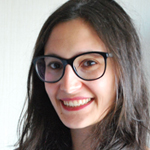Tina Gruosso is a scientist who completed her PhD in Paris and her postdoctoral fellowship in Montreal in oncology and tumor microenvironment. Tina is an advocate for evidence-based policymaking, innovation, science diplomacy, science communication and diversity. She is President of Science & Policy Exchange (SPE), a student led non-profit organization devoted to engaging the next generation for science advice, science communication, and evidence-informed policy. Tina is also vice-chair of communication for the Montreal chapter of Women In Bio.
Science diplomacy. Tina Gruosso believes the concept was always part of the way she sees and does science, but she did not realize it until she heard these two words used together.
Science can do more, but how?
Driven by her curiosity and passion for science, Tina studied biology at university with the goal of making the world a better place by curing people with new drugs. However, she knew that science was greater than just accumulating knowledge and discovering new drugs. Science can do more, but how? Academia does not teach students about all the applications of science, so Tina pursued her world-saving goal by doing several internships in the US, completing a PhD in Paris, and a postdoctoral fellowship in Montreal. In Montreal, she began community engagement work through the non–profit organization Science & Policy Exchange (SPE). SPE aims to foster a dialogue between early career scientists, the private sector, and policy stakeholders to better serve society. Through SPE, she attended the first “Science Diplomacy” event in Montreal, which allowed her to put a name to the feeling of “science can do more” – science diplomacy. From that moment on, she recognized that this was what she had been wanting to do all those years, while studying science and doing research: build a more peaceful world. Science diplomacy can be leveraged to accomplish amazing international collaborations and establish and maintain solid international relationships.
After the first science diplomacy event she attended, Tina looked at her 14 pages of notes and decided that those could not just sit on her computer. She had to tell other early career scientists what she had realized that day, because some might be pursuing science with the same secret goal without being able to name it. She wrote a report in French and in English, and was invited to the second science diplomacy event in Montreal by the Chief Scientist of Quebec. At this event, the lack of early career scientists in the discussions became obvious. The speakers discussed how communication to the public is important in disseminating scientific knowledge and that a researcher’s international mobility is key to science diplomacy. Early career researchers are inherently more mobile than established researchers. They are often receptive to and familiar with novel and diverse communication platforms. If early career researchers and scientists can be leveraged for science diplomacy , then why was she the only student in the room? Early career scientists need to be aware of the key role they can play and science diplomacy stakeholders and diplomats need to seize this opportunity and ensure early career scientists have a space at the science diplomacy table. With the G7 happening here in Quebec in 2018, this was the time to display these strengths.
Tina pitched these ideas to her SPE colleagues. One in particular was excited about her stories and science diplomacy – Neha Bhutani, postdoctoral fellow and newly converted science diplomacy “aficionada.” They were both convinced that there is a need to create a push and a pull: to train early career scientists in science diplomacy and foster a space at the discussion table. SPE put together a two-day event during which students trained with a hands-on negotiation simulation experience to realize that although science is important, many more considerations need to be taken into account during international discussions and negotiations. SPE brought students and science diplomacy stakeholders together to discuss and interact with a panel of experts. The objective was to define the key role that early career scientists can play in science diplomacy and how to increase their presence in that domain for the benefit of society. The report and recommendations were released at the 2018 AAAS Science Diplomacy event.
Scientific training is wonderful in many ways. Unfortunately, academia only shows one perspective and one way to do science. To students and early career scientists, be assured that there are many fields in which science can have an impact and be a driver of change. Science diplomacy is one of them.
Yes, “science can do more” – now you know how.
